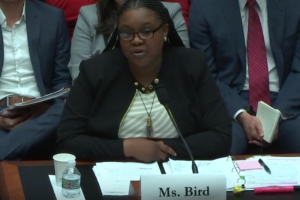On May 21, 2019, the U. S. House of Representatives Committee on Education and Labor, chaired by Rep. Bobby Scott (D-VA), held a hearing, Eliminating Barriers to Employment: Opening Doors to Opportunity.
Kisha Bird, Director of Youth Policy at the Center for Law and Social Policy (CLASP), one of the lead organizations in the Reconnecting Youth Campaign, gave powerful testimony about the barriers and solutions to opportunity for Opportunity Youth and people impacted by the criminal justice system.
Watch Kisha Bird’s Testimony, May 21, 2019 | Washington, DC:
You can watch the full Committee hearing (including Chair Scott’s opening words), here.
Read Kisha’s full testimony here (PDF).
Except from Kisha’s Remarks:
Chairman Scott, Ranking Member Foxx and Members of the Committee: thank you so much for the opportunity to testify on barriers to employment. I am Kisha Bird, the director of youth policy at the Center for Law and Social Policy, or CLASP, an anti-poverty organization. We work nationally and with states and communities around the country.
Today, you’ve asked me to address barriers to opportunity that affect young people, including Opportunity Youth — young people ages 16 to 24 who are not in school or work — and people impacted by the criminal justice system. In my written testimony, I also include other workers who face barriers.
Today I want to make four key points:
First, the Economy is leaving out too many people. Despite extremely low unemployment rates, millions of would-be workers are locked out of the labor market, and millions more are stuck in low-wage jobs that cannot support a family. For example, approximately 4.5 mill young people are Opportunity Youth. And people impacted by the criminal justice system are unemployed at a rate of 27 percent. For black men and women who have returned from incarceration, that figure jumps to 35.2 percent and 43.6 percent, respectively.
Second, the barriers to employment that face youth and adults locked out of opportunity are structural. They arise from systems and policies, and not individual choices. We know the key structural and systemic factors include mass incarceration, racism and discrimination, segregation and isolation from inner cities to rural communities. We know policy and investment failures in the K-12, adult and post-secondary education systems and major gaps in access to work supports like child care.
Third, the federal government is critical to addressing barriers to employment, in partnership with states, communities and business. The federal government and in particular, this Committee, has a central role in dismantling barriers based on race, gender, geography, income and ability. Federal education and workforce development funds are investments in equity. They are the funds that build the equity framework and infrastructure by focusing on effective interventions like career pathways, and disparately impacted populations. But this crucial role has been weakened by the erosion of budget investments. For example, while 36 million adults need foundational skills, adult education at current levels only serve 1.4 million annually so we have a tremendous gap in service.
Fourth and finally, we know what works and where investments need to be made.Simply put, it’s really time to act.
Among the immediate steps that I would urge the Congress to consider are:
- Lift budget caps to make critical investments in workforce development, adult education, post-secondary education and critical work supports like child care. Invest in strategies for job creation and youth reconnection, summer youth employment, for example through the Open doors Act for Youth.
- Make improvements in the Workforce Innovation and Opportunity Act in tandem with the Higher Education Act.
- Directly address the consequences of incarceration. This could include ensuring background checks are accurate, such as the Chairman’s Fairness and Accuracy in Criminal Background Checks Act, restoring Pell Grants to individuals who are incarcerated, and investments in correctional education.
In conclusion, I urge Congress to build in what we already know from research, state and local experience and young people and impacted communities themselves. Directly address the structural barriers that I’ve mentioned here today, invest in equity and spreading innovation, for example through infrastructure.
I urge Congress to create a plan for universal access to education and employment for all young people and individuals impacted by the criminal justice system.
Read the full testimony here (in PDF format).![]()
To learn more about the hearing, visit the Committee website here.







